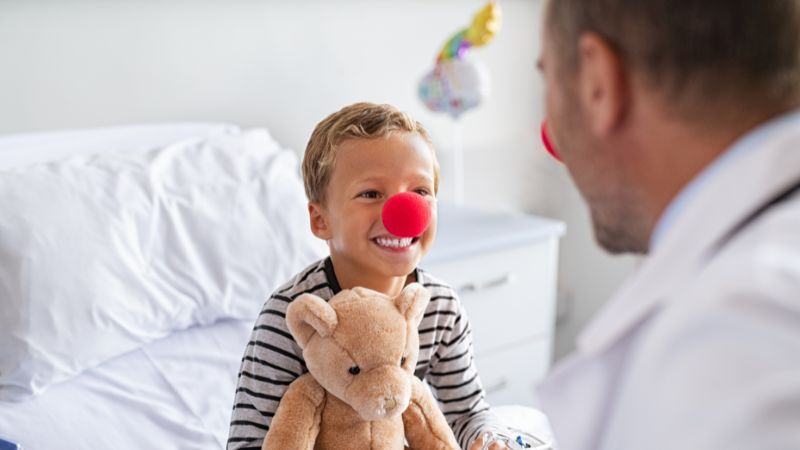
The Society
More than 35,000 clinicians, scientists and allied health professionals from over 160 countries are part of the ERS community
Become an ERS member



Embargo: 15.45hrs CEST on Sunday 8 September 2024
Vienna, Austria:
Spending time with a medical clown can shorten the length of hospital stay for children with pneumonia, according to research presented at the European Respiratory Society (ERS) Congress in Vienna, Austria [1]. They can also reduce the duration of intravenous antibiotic use.
The study was presented by Dr Karin Yaacoby-Bianu from Carmel Medical Center and the Rappaport Faculty of Medicine, Technion – Israel Institute of Technology, Haifa, Israel.
She explains: “Medical clowns undergo specific training to work in hospitals. They have been shown to reduce pain and alleviate stress and anxiety in children and their families during medical treatment, and have been gradually integrated into many aspects of hospital care. But their impact on children being treated for pneumonia has not yet been investigated.
“Community acquired pneumonia is one of the leading causes of hospitalisation in children, globally. A child’s length of hospital stay depends on several factors including their well-being, vital signs, need for intravenous fluids and antibiotics and whether they develop complications.”
The team followed 51 children aged between two and 18 years old, who had been hospitalised due to pneumonia. One group received standard care, the second received standard care plus a 15-minute visit from a medical clown twice daily during the first 48 hours of hospitalisation.
Three medical clowns from The Dream Doctors Project [2] used various techniques to relax the patient, for example music, singing, and guided imagination. They also encouraged the children to drink and eat by themselves again.
The researchers found that the group who were visited by a medical clown had a shorter hospital stay (43.5 hours on average vs 70 hours) and only needed two days of IV antibiotics treatment, compared to three days in the control group. In the clown group, researchers also noted a significant decrease in respiratory rate, heart rate and inflammatory markers.
Dr Yaacoby-Bianu explains: “While the practice of medical clowning is not a standardised interaction, we believe that it helps to alleviate stress and anxiety, improves psychological adjustment to the hospital environment and allows patients to better participate in treatment plans like adherence to oral antibiotics and fluids. This in turn helps the children to recuperate faster.
“Laughter and humour may also have direct physiological benefits by lowering respiratory and heart rates, reducing air trapping, modulating hormones, and enhancing the immune function.”
The team are running further studies on the effect of medical clowns on other diseases to see where they might be most effective.
Dr Stefan Unger is Chair of the ERS Group on Paediatric Respiratory Infection and Immunology and Consultant Respiratory Paediatrician at the Royal Hospital for Children and Young People Edinburgh, UK, and was not involved in the research. He said: “This study indicates the positive effect that humour can have in healthcare settings and emphasises the potential for non-pharmacological interventions to influence clinical outcomes.
“Shortening the length of children’s hospital stays by adding medical clowns to a multidisciplinary care team in cases of pneumonia may reduce physical and emotional stress on children and their families. It may also reduce costs and lift some of the burden on healthcare systems.
“The specific mechanisms by which humour influences clinical outcomes remain a subject for future investigation and further trials in larger patient cohorts are indicated to confirm the findings of this study.”
[1] View the full abstract content (p/w:3R524YAACOBY)
Notes to editors
Images of Dr Yaacoby-Bianu and professional clown ‘tres jolie’ are available on request.
Please acknowledge the European Respiratory Society Congress as a source in any articles:
[1] Abstract no: OA1990 “Medical clown intervention shortens length of hospitalization in children with community acquired pneumonia”, by Karin Yaacoby-Bianu et al; Presented in session, “Advancements in paediatric infectious respiratory health” at 15.45-17.00 CEST on Sunday 8 September 2024. [https://k4.ersnet.org/prod/v2/Front/Program/Session?e=549&session=17869]
Funding: This research received the Sharon Foundation competitive research grant award in 2018.
[2] The Dream Doctors Project aim to promote medical clowning as an officially recognised paramedical profession: https://dreamdoctors.org.il/
According to the UK Academy of Medical Science’s press release labelling system, this is a non-peer reviewed randomised controlled trial in people.
Note: When obtaining outside comment, journalists are requested to ensure that their contacts are aware of the embargo on this release.
The European Respiratory Society (ERS) Congress is a once-a-year occasion when the world’s respiratory experts come together to present and discuss the latest research in respiratory medicine, including topics such as asthma, COPD, lung cancer, pollution, smoking and vaping. The Congress welcomes thousands of participants from all over the world each year, facilitating the exchange of scientific and clinical excellence across the entire field of respiratory medicine. The reputation of ERS derives from the outstanding scientific programme of its Congress, which this year is available to in-person and online participants: www.ersnet.org/congress
Further information:
Sian Halkyard
Mobile: +44 (0) 7970 096 175
Email: sianhalkyard@gmail.com
Kerry Noble
Mobile: +44 (0) 7446 869 433
Email: kerry@ricemasonnoble.eu